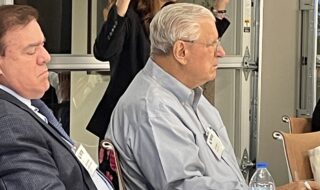June 16, 2025
New state budget passed. July 1 tax and minimum wage changes ahead
Welcome to the June 16-20 edition of the Main Street Minute from your small-business-advocacy team in Sacramento.
Small Business and the New State Budget
As constitutionally required by June 15, the Legislature passed a state budget for the 2025-2026 Fiscal Year starting on July 1. These three paragraphs from a CalMatters report, California lawmakers approve $325 billion budget ‘passed on hope,’ best summarize what just transpired over the weekend. Bolded emphasis added by the Main Street Minute.
“The California Legislature passed a state budget today [June 13] that relies more on borrowing than spending cuts to close a projected $12 billion deficit, aiming to push off difficult decisions about priorities even as that gap is only expected to grow in future years.
“The $325 billion legislative spending plan … is something of a formality, because lawmakers are constitutionally required to pass a balanced budget by June 15 or forgo their pay.
“Having rejected many of the cuts to social services that Gov. Gavin Newsom proposed last month to stabilize California’s finances long-term, they must now negotiate a compromise in the coming weeks, with the July 1 start of the fiscal year looming.”
Of interest to small business
The budget dedicates no money to pay down or off the state’s $20.3 billion outstanding debt with the federal government from the loans it took out to keep its unemployment insurance (UI) trust fund solvent and unemployment benefits going to those in need of them.
That leaves California the last man standing out of the 22 states that needed UI loans (Title XII advances) after New York’s elected officials agreed last month to pay off its loan once and for all. Only the U.S. Virgin Islands (a territory) is keeping California company in owing Uncle Sam some money ($51 million).
In a search of the new budget, you will indeed find a UI allocation, but that is only to pay the interest on the debt, which the state is obligated to do. In a conversation with NFIB State Director John Kabateck, a top Newsom aide told him the governor desired to tackle the loan but didn’t believe he could get any support from the Legislature.
For the foreseeable future, businesses can expect to pay higher UI taxes.
Good News
The fastest way to get anything into law is to bypass all those committee hearings and votes (the process) and insert what you want into the upcoming state budget instead.
That is what was done to Assembly Bill 609 (Wicks), exempting some housing development projects from CEQA requirements, and Senate Bill 607 (Wiener), curbing the overuse of environmental impact reports.
NFIB supported both bills and was happy to see them expedited via the state budget route. Although it’s a sad commentary that it took the Southern California wildfires to make the Legislature see the light on something that would have naturally been good public policy.
Big California News Out of Washington D.C.
President Trump handed Californians some good news last Thursday (June 12) when he put his signature on measures rolling back some of the rule-making excesses of the California Air Resources Board (CARB). Rules promulgated by state agencies like CARB are permanent and not subject to legislative review and change, but as we all learned in sixth grade civics class, federal law supersedes state law.
Reported the Los Angeles Times, “By signing these three bills into law, Trump invalidated … regulations adopted by California environmental rule makers and undercut California’s long-standing authority to set more rigorous vehicle emission standards:
“The Advanced Clean Cars II rule would’ve required car companies to sell California dealerships an increasing percentage of new zero-emission or long-range hybrid vehicles, starting at 35% in 2026. The regulation would’ve culminated in a ban on the sale of new gas-only cars in California in 2035.
“Advanced Clean Trucks rule, which would’ve required a significant percentage of medium- and heavy-duty truck sales be zero-emission by 2035.
“The Heavy-Duty Engine and Vehicle Omnibus rule that established cleaner engine standards and required warranties for new heavy-duty vehicles.
“’It’s had us tied up in knots for years,’ Trump said in his remarks Thursday morning. ‘They’d pass these crazy rules in California, and 17 states would go by them. The automakers didn’t know what to do because they’re really building cars for two countries.’”
Not out of the Regulatory Woods Yet
The above section does not include CARB’s Low-Carbon Fuel Standard, which was adopted November 8, 2024, and which NFIB opposed.
“NFIB contends that shifting dollars to subsidize unclean biofuels does nothing to further California’s stated goals of reaching a zero-emissions, fully-electrified state. Instead, the LCSF amendments, if implemented, would only serve to economically hurt small business owners and their employees while simultaneously driving up the costs of goods and services for all Californians,” wrote NFIB California policy director Tim Taylor in a letter of support for Senate Republican Leader Brian Jones’s Senate Bill 2, which called for voiding specified amendments and providing immediate relief from unnecessarily high gasoline prices.
“Originally, CARB had indicated that its proposed amendments would increase gas prices at the pump by some forty-seven cents a gallon. Later, it revised that number and indicated that the fiscal impact at the pump would be “negligible,” without providing any methodological data or inputs to account for that revision.”
SB 2 never passed its first committee and is effectively dead for the year. NFIB was the only business group to endorse Jones’s bill.
You Have Two Weeks to Prepare
Costs are a forever worry of small business owners. If not at their desk penciling out their calculations and figures, their minds are constantly trained on costs even while engaged in life’s constant other distractions. NFIB reminds its members to figure in some rising costs that start July 1.
On that date, the excise tax on a gallon of gas rises to 61.2 cents from 59.6 cents and for diesel fuel to 46.6 cents from its current 45.4 cents. This single page of information from the California Department of Tax and Fee Administration has the breakdown.
Also going up are taxes on cannabis and on tobacco.
Speaking of the CDTFA, it also administers local and district taxes. According to the department’s website, “The base statewide sales and use tax rate is currently 7.25 percent (7.25%) and is made up of three parts:
6.00% State
1.00% Local Jurisdiction
0.25% Local Transportation Fund
“Tax rates that exceed the base statewide sales and use tax rate of 7.25% within specific areas are the result of voter-approved district taxes imposed by certain cities, counties, and other local jurisdictions. Some areas in California do not impose district taxes while other areas have multiple district taxes in effect. District taxes are imposed at various rates.”
The people of Lancaster and Palmdale, both in Los Angeles County, love imposing district taxes. Their sales and use tax rates are the highest in California at 11.250% each.
On July 1, as a result of local and district tax increases, the sales tax rates in California City (Kern County) rise to 8.250%; in Lemon Grove (San Diego County) to 8.750%; and in Colma (San Mateo County) to 9.8750% reports the CDTFA. The sales tax rates in Napa County (7.750%) and Palm Springs (9.250%) have been extended.
What’s the sales and use tax rate in your locality? Click here for the department’s list of them all. Be sure and check the ‘ Notes’ section for any variations.
Wait. We’re not done with July 1.
Check out this story, Are You Ready for July 1? Select State and Local Minimum-Wage Rates Increasing, from the May 26-30 edition of the NFIB California Main Street Minute.
Calendar
— June 19: Juneteenth Holiday. Legislature not in session.
— July 4: Independence Day. Legislature not in session.
— July 18: August 17 Summer recess.
— August 26: NFIB California’s Leadership Day at the Capitol
— September 12, 2025-January 5, 2026: Interim recess of the 2025-2026 session of the California State Legislature.
— October 15: Last day for governor to sign or veto bills passed before September 12.
National
NFIB members spent a very busy and productive week at the Fly-In event to lobby Congress on the legislation important to Main Street enterprises, especially on the importance of making the Small Business Deduction permanent. House Speaker Mike Johnson gave the keynote address. Small business owners spent three days meeting with their representatives from back home. Pictures of some of the meetings can be found on this special hashtag, #NFIBFlyIn2025.
Next Main Street Minute: June 23. All Main Streets Minutes can be found on the NFIB website here. Pull down the California tab in the upper-right-hand corner.
NFIB is a member-driven organization advocating on behalf of small and independent businesses nationwide.
Related Articles














